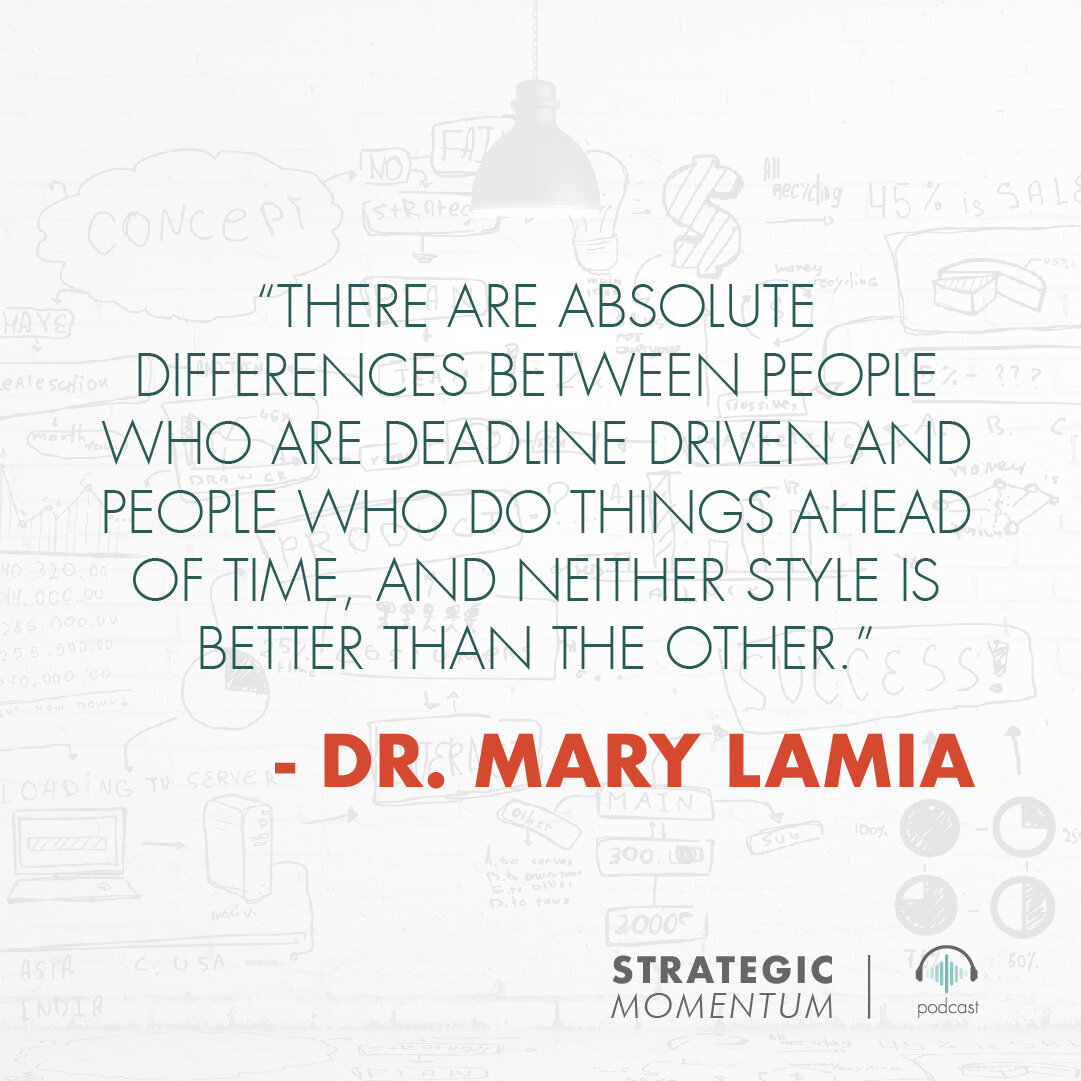Ep. 12 - Motivational Styles of Successful People: Task vs. Deadline-Driven
Find Us Wherever You Listen To Podcasts
Returning guest Dr. Mary Lamia is a psychologist who has spent her career studying and encouraging emotional awareness.
She is the author of numerous books for kids, teenagers, and adults, including What Motivates Getting Things Done and the upcoming The Upside of Shame.
In our last conversation with Dr. Lamia, we explored how emotions – even “negative” ones – act as octane that motivates us. Today we’re digging into the different motivational styles of successful people, how people leverage different emotions for different motivational styles, and how understanding your own natural style, while embracing the differences of others, can help you build and maintain strategic momentum in your business environment.
Valuing the Differences: Deadline-Driven & Task-Driven
There are absolute differences between people who are deadline-driven and people who are task-driven, but neither style is better than the other. The divergent ways in which high-achieving people are motivated to complete tasks is based on when their emotions are activated and what activates them.
Procrastinators who consistently complete tasks on time, even if it's at the last moment, are motivated by emotions that are activated when a deadline is imminent; they're deadline-driven.
Task-driven non-procrastinators, when faced with uncompleted tasks, feel compelled to take action right away. The task was a stimulus that activates their emotion and they have to do it to relieve themselves of the effects they feel. So they're motivated to do things constantly.
What Constitutes Success?
Is getting something done ahead of time better than getting it done at the deadline? No. Benjamin Franklin told us that the early bird gets the worm, but the Futurist Paul Saffo says sometimes it's the second mouse who gets the cheese.
In studying high achievers, Dr. Lamia discovered that, regardless of how they define success, two things remain constant:
They never ever miss a deadline, even if they are the most severe procrastinators.
Their work always reflected their best efforts.
So it doesn't matter how you are motivated – you just need to understand what emotions drive and build systems to leverage them. For example, Dr. Lamia wrote in Psychology Today about how procrastinators create false deadlines when there are none so that they can always motivate themselves.
Key Takeaways
The differences in motivational styles are rooted in the way they are motivated to complete tasks which is based on emotional triggers. However, neither style is better than the other.
You need to understand what motivational style works optimally for you; understanding how to use your emotions as octane will help you put in your best effort and maintain momentum, without ever missing a deadline.
You also need to understand other people’s motivational styles, and you need to use the right criteria when you evaluate others in a work environment. It's not about how they get something done – Do they get the work done before a deadline and have they done their best?
We have to learn to take into consideration the people around us and let them know how we work best, so that they're not annoyed by our behavior.
Task-driven people annoy procrastinators just as much as procrastinators annoy task-driven people, except procrastinators don't admit that as much because they have been so stigmatized and shamed about their motivational style.
Resources:
Learn more at MaryLamia.com
Read: What Motivates Getting Things Done: Procrastination, Emotions, and Success
Pre-order: The Upside of Shame: Therapeutic Interventions Using the Positive Aspects of a "Negative" Emotion (release date: 2/6/18)
Subscribe to the Strategic Momentum podcast:
On Stitcher Radio
On Spotify











